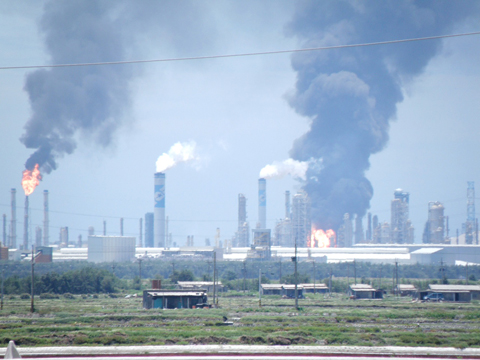Formosa Petrochemical Corp (台塑石化), the nation’s only listed oil refiner, said it had halted its No. 1 ethylene plant following a fire.
The blaze occurred at about 11:50am yesterday and is now under control, the company said in a statement delivered via mobile text-message. No one was injured, the Mailiao (麥寮), Yunlin County-based refiner said.
Formosa Petrochemical has three ethylene plants with a combined annual capacity of 2.935 million tonnes, including the No. 1 plant’s 700,000 tonnes. Ethylene is a raw material for plastics, chemicals and synthetic fibers. The company’s No. 2 ethylene plant has an annual capacity of 1.035 million tones, while the No. 3 plant offers 1.2 million tonnes.

PHOTO: CHEN TSAN-KUN, TAIPEI TIMES
Chemical supply to customers this month won’t be affected by the accident as the company draws on inventories, Formosa Petrochemical spokesman Lin Keh-yen (林克彥) said by telephone.
The impact on supply next month has yet to be determined, he said.
“We can’t evaluate how long the plant will be shut yet,” he said.
Asian naphtha prices fell yesterday on concern that demand from Taiwan would slow following the fire at Formosa plant. Open-specification naphtha dropped 1.7 percent to US$612.25 per tonne, according to data compiled by Bloomberg.

KEEPING UP: The acquisition of a cleanroom in Taiwan would enable Micron to increase production in a market where demand continues to outpace supply, a Micron official said Micron Technology Inc has signed a letter of intent to buy a fabrication site in Taiwan from Powerchip Semiconductor Manufacturing Corp (力積電) for US$1.8 billion to expand its production of memory chips. Micron would take control of the P5 site in Miaoli County’s Tongluo Township (銅鑼) and plans to ramp up DRAM production in phases after the transaction closes in the second quarter, the company said in a statement on Saturday. The acquisition includes an existing 12 inch fab cleanroom of 27,871m2 and would further position Micron to address growing global demand for memory solutions, the company said. Micron expects the transaction to

Vincent Wei led fellow Singaporean farmers around an empty Malaysian plot, laying out plans for a greenhouse and rows of leafy vegetables. What he pitched was not just space for crops, but a lifeline for growers struggling to make ends meet in a city-state with high prices and little vacant land. The future agriculture hub is part of a joint special economic zone launched last year by the two neighbors, expected to cost US$123 million and produce 10,000 tonnes of fresh produce annually. It is attracting Singaporean farmers with promises of cheaper land, labor and energy just over the border.

US actor Matthew McConaughey has filed recordings of his image and voice with US patent authorities to protect them from unauthorized usage by artificial intelligence (AI) platforms, a representative said earlier this week. Several video clips and audio recordings were registered by the commercial arm of the Just Keep Livin’ Foundation, a non-profit created by the Oscar-winning actor and his wife, Camila, according to the US Patent and Trademark Office database. Many artists are increasingly concerned about the uncontrolled use of their image via generative AI since the rollout of ChatGPT and other AI-powered tools. Several US states have adopted

A proposed billionaires’ tax in California has ignited a political uproar in Silicon Valley, with tech titans threatening to leave the state while California Governor Gavin Newsom of the Democratic Party maneuvers to defeat a levy that he fears would lead to an exodus of wealth. A technology mecca, California has more billionaires than any other US state — a few hundred, by some estimates. About half its personal income tax revenue, a financial backbone in the nearly US$350 billion budget, comes from the top 1 percent of earners. A large healthcare union is attempting to place a proposal before